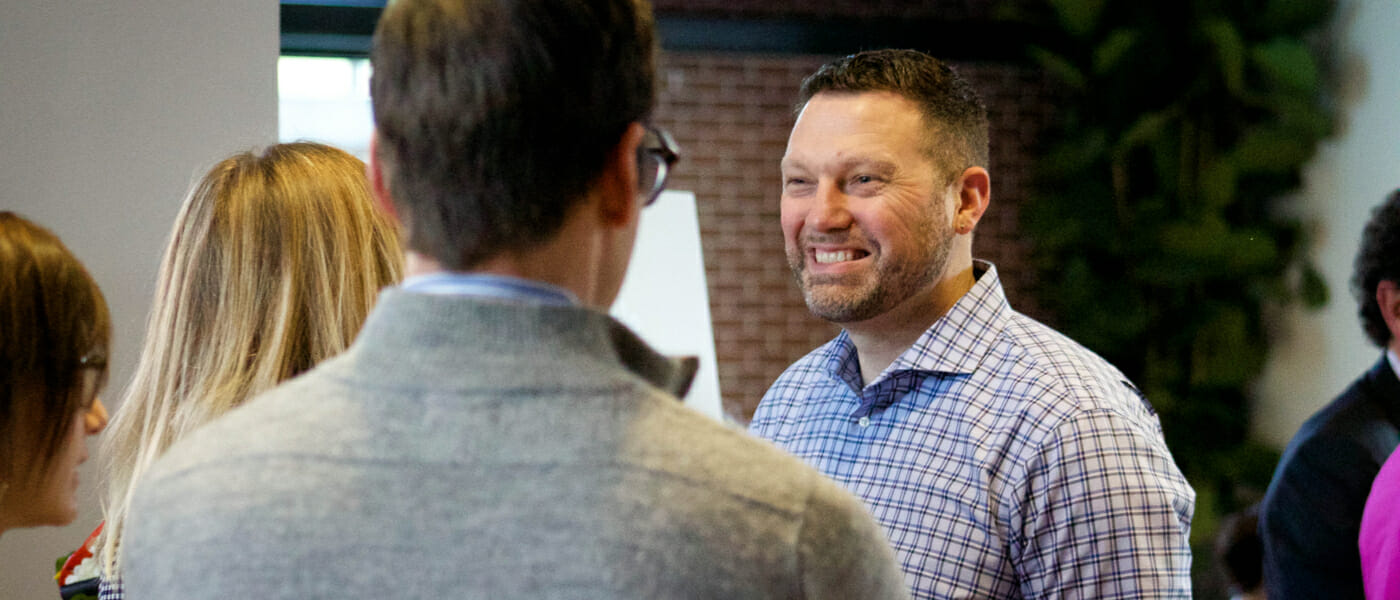Additional
Programs
In addition to our other programs, we offer a suite of supportive services including employment support, medical services, peer support services, and our homeless resource center program.
In addition to our other programs, we offer a suite of supportive services including employment support, medical services, peer support services, and our homeless resource center program.

First Step House developed and launched the Employment Preparation and Placement (EPP) program in 2018 to address the specific supportive employment needs of no and low-income individuals, including Veterans, with chronic substance use disorders, co-occurring mental health conditions, histories of homelessness, and criminal justice involvement. This program is based on the evidence-based Individual Placement and Support (IPS) supported employment model and its eight principles:
Our EPP program supports individuals in obtaining meaningful, long-term employment that fits their specific needs, skills, experience, education, interests, and goals. We believe that work is a part of recovery and that employment should be a mutually beneficial and fulfilling experience for both the employer and employee. This is why we work hard to discover the needs of local businesses in order to find the best match possible for all parties involved. Our supportive employment program seeks to improve the quality of life for each individual we serve, and to help each business we connect with achieve their goals.
In addition to rapid engagement and placement in competitive jobs, this model is tied to clinical treatment services. In other words, the participant’s clinical team participates, in a hands-on way, with their vocational services, assisting with on-the-job problem solving, and making recommendations to remain stable in their employment.
No. The EPP program helps clients identify what type of long-term employment they want and then do whatever is needed to help clients obtain their dream job!
We service both clients and employers. For employers, we provide access to a high-quality, ready workforce. For clients, we offer employment support at every level, including: career counseling; help with resume building and interview skills; assistance with the job search, including building individual relationships with quality employers; help in keeping a job and moving up in a job; assistance in navigating difficult situations that can arise, such as workplace disputes or the need for accommodations.
Yes. Our program helps clients navigate any educational goals, whether those goals include obtaining a college degree, a trade program completion, a GED, or any other education program completion.
No. Support is lifelong and ongoing as long as a client chooses to participate in the program. We support clients over the course of years, including job starts and stops, education enrollments and completions, and more.
There are two criteria for EPP program participation. 1) The client wants to work. 2) The client is receiving First Step House services in some capacity at the time of entry into the program.
Our program consistently exceeds benchmark outcomes for similar programs. We believe we have a high level of success because we help clients identify what they truly want to do rather than perpetuating patterns of working jobs that they have no desire to be in. We also attribute our success to the evidence-based model we use, which is called IPS (Individual Placement and Support).
Our medical team provides immediate, on-site, and integrated services to meet the healthcare needs of our patients receiving behavioral health treatment. First Step House participants arrive at our doorstep directly from homelessness, the state hospital, or incarceration, with little or no income and many barriers to overcome, including chronic substance use disorders and co-occurring mental health conditions, a lack of insurance, no established care, and decades of neglected health conditions.
Launched in 2018, this program utilizes registered nurses, including an advanced practice registered nurse, and medical technicians to effectively address our patients’ medical needs at each stage of their engagement (admission, treatment, and discharge) through the following activities:
Yes, bring all medications that are in the original prescription bottles.
Yes, we will help get you established with a primary care provider. We also have a Nurse Practitioner on staff who can help you.
We will help you with your medication refills. We have medication technicians who will let you know when you need a refill and provide you with the phone number to call to get the refills organized.
We encourage you to use a pharmacy that delivers to FSH. We will provide you with the pharmacy contact information so that you can get your medications delivered while in the program.
Yes, if they are in the original prescription bottles.
We have medications technicians who will pass you your medications from the medication room where they are stored four times daily.
We do provide several over-the-counter medications. We offer multi-vitamins, vitamin C, Tylenol, ibuprofen, stool softener and antidiarrheal medications. All other over-the-counter medications will require a prescription from your provider.
The Peer Support Services Program provides peer-based supportive services, delivered by certified peer support specialists, to reduce barriers to substance use disorder recovery and increase recovery stability. Services include assisting clients with creating and implementing a Wellness and Recovery Action Plan (WRAP), life skills and community resource classes, housing support, employment support, recovery coaching, and assertive linkage with community-based recovery resources. Program services result in the development of prosocial relationships and activities, housing stability, increased access to community resources, enhanced life skills, improved employment, reduced drug and alcohol use, positive behavior changes, increased knowledge of and access to resources and benefits, and improved health and wellness.
Support from peer support specialists complement, but do not duplicate or replace treatment from therapists and case managers. Peer support specialists’ model effective coping techniques, inspire clients and help them effectively progress toward recovery, dispel myths about behavioral health conditions, provide self-help education, and link clients to beneficial resources/tools. Research shows that peer support services create a positive and long-lasting impact for people with chronic behavioral health conditions and the greater community, leading to fewer crises/hospitalizations, less substance use, improved living circumstances, enhanced income and health, improved employment and housing, increased ability to cope, and reduced relapse and homelessness.
Through their own recovery journey and lived experience, peer support specialists provide evidence-based modalities to help clients achieve recovery, wellness, and self-sufficiency goals. Peer support specialists model effective coping techniques and self-help strategies, provide life-skills classes, help clients develop goals and strategies, and connect clients to community resources. Support from peer support specialists complement, but do not duplicate or replace support/treatment from therapists and case managers.
The program utilizes the evidence-based modality, Wellness Recovery Action Plans (WRAPs). The WRAP process supports you to identify the tools that keep you well and create action plans to put them into practice in your everyday life. All along the way, WRAP helps you incorporate key recovery concepts and wellness tools into your plans and your life.
Yes, peer support specialists transport clients to recovery meetings in the community as well as facilitate community service activities. Peer support specialists connect clients to volunteer opportunities with local organizations, including fit to recover, recovery soldiers, USARA (Utah Support Advocates for Recovery Awareness), and earth community garden & food pantry. We believe that giving back is a valuable part of the recovery process.
The First Step House Resource Center Program provides services to individuals at the Men’s Homeless Resource Center, which is located at 3380 South 1000 West, South Salt Lake, UT 84119. In coordination with the Road Home of the Men’s Homeless Resource Center, First Step House staff provide on-site behavioral health assessment, referral to First Step House and other treatment providers, and peer support services to help people experiencing homelessness, substance use disorders, and mental health conditions access the support they need. Through this program, we provide triage and stabilization as well as conduct assessments, make referrals to treatment, offer support services, and provide case management.
Call ARS/Assessment & Referral services and set up a phone assessment appointment. You can then show the court you’ve received your assessment. Their number is (801) 587-2770.
Yes, our peer support specialists can help you get connected to detox services through the usual, publicly available channels (VOA, LDS Hospital, etc.), but we do not have special access or designated detox beds.
No – we cannot directly help you get housing. Our primary role is to help people get connected to substance use treatment services. However, we often help people coordinate with the housing case managers at the shelter, and they can help you get housing.
No, but we can direct you to the proper people and may be able to advocate for you. We have no direct access to shelter beds and cannot decide who will be allowed into the shelter, though we’ve often directed people to the proper staff at the shelter to get beds.

We offer a true continuum of care including evidence-based substance use disorder and mental health treatment, targeted case management, supportive employment, healthcare, and physical housing. We advocate for and case manage people from homelessness and triage to treatment completion, recovery housing, employment, permanent housing, and self-sufficiency.
At First Step House, we recognize that treatment is necessary, but insufficient on its own for sustaining the long-term, whole health needs of an individual. Offering supportive services in conjunction with behavioral health treatment creates long-term positive outcomes for our target population. We are a research-based healthcare provider committed to transforming the cultural norms of our sector that contribute to health disparities and inaccessible or ineffective care.
Visit our Admissions Department today to learn more about our treatment, case management, and housing programs. We provide comprehensive and client-centered services to help people build productive, meaningful, and healthy lives.